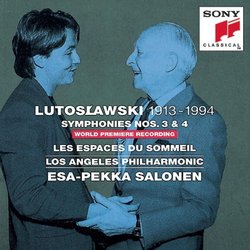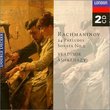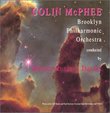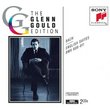| All Artists: Witold Lutoslawski, Esa-Pekka Salonen, Los Angeles Philharmonic, John Shirley-Quirk - Baritone Title: Witold Lutoslawski: Symphonies Nos. 3 & 4 / Les Espaces du Sommeil Members Wishing: 0 Total Copies: 0 Label: Sony Classical Release Date: 10/4/1994 Genres: Pop, Classical Styles: Vocal Pop, Opera & Classical Vocal, Historical Periods, Modern, 20th, & 21st Century, Symphonies Number of Discs: 1 SwapaCD Credits: 1 UPC: 074646628027 |
Search - Witold Lutoslawski, Esa-Pekka Salonen, Los Angeles Philharmonic :: Witold Lutoslawski: Symphonies Nos. 3 & 4 / Les Espaces du Sommeil
 | Witold Lutoslawski, Esa-Pekka Salonen, Los Angeles Philharmonic Witold Lutoslawski: Symphonies Nos. 3 & 4 / Les Espaces du Sommeil Genres: Pop, Classical
Witold Lutoslawski (1913-1994) went through many changes in his career, but it was always in the service of his own style--which is, in the end, indescribable. This is an excellent disc that details some of the later tra... more » |
Larger Image |
CD DetailsSynopsis
Amazon.com essential recording Witold Lutoslawski (1913-1994) went through many changes in his career, but it was always in the service of his own style--which is, in the end, indescribable. This is an excellent disc that details some of the later transformations in Lutoslawski's thinking. The Symphony 4 (1992), which opens the disc, really highlights the composer's gift for melody, despite his atonal characterizations elsewhere. The work, while moving and dramatic, is extremely intense. Symphony 3 (1972-83) mixes tempos and interrupts moods constantly. Les Espaces du sommeil (1975) is a mixture of the concrete and abstract that creates an eerie, dreamlike scenario. This is one of Lutoslawski's masterpieces. --Paul Cook Similarly Requested CDs
|
CD ReviewsGreatest Symphonist since Mahler. Karl Henzy | 01/06/1999 (5 out of 5 stars) "I have become convinced that Lutoslawski is the greatest symphonist since Mahler, with only Elliott Carter as an contempory equal in orchestral writing. Carter may even surpass Lutoslawski if his Symphonia is as great as press reports say (a recording should be released next year), but that doesn't take away from what Lut. has accomplished. Symphonies 2-4, along with Livre Pour Orchestre, Novelette, and the various Concerti, all repay multiple listenings. Symph.No.3 is probably the masterpiece, all-in-all, but No.2 is the most radical experimentally, while No.4 may be the most beautiful. In all of them, you get continual surprises, vibrant sounds and rhythms, and a wholely original means of organization, like nothing before it. While Lut. is entirely modern, he's not so dark and dreary as some modern composers, nor is he simplistic like the minimalists. He's just great." Salonen's Third is better than the conductor's own version R. Hutchinson | a world ruled by fossil fuels and fossil minds | 06/04/2005 (4 out of 5 stars) "The first recording I heard of Lutoslawski's Third Symphony was the first, with Lutoslawski himself conducting the Berlin Philharmonic in November, 1985. You can find it on THE ESSENTIAL LUTOSLAWSKI (see my review), an excellent 2-disc Philips set. The Third was widely acclaimed as one of Lutoslawski's masterpieces, but I just didn't hear it. About three years later, I finally heard Salonen's recording with the Los Angeles Philharmonic, from just one month later, December, 1985 -- it is a much stronger, more biting, more convincing interpretation and performance. A clear lesson that composers are not always their own best interpreters! On the other hand, I am still not convinced that the Third is one of Lutoslawski's best works, nor that it is one of the best late 20th century symphonic works. It basically just meanders in a series of digressions, some at very low volume, and while it has several compelling passages, it never coheres into any sort of compelling structure. (The Second Symphony, also available from Sony with Salonen conducting, is even more shapeless and meandering!) So the 4 stars is for composition, not for conducting, performance or recording, all of which merit 5 stars. The Fourth Symphony, one of Lutoslawski's last, was commissioned by Salonen and the LAP. It is a shorter work for smaller forces, sounding more like chamber music than a symphony. Though less ambitious than the Third, it is more coherent. I prefer the version on Naxos, though, with Antoni Wit conducting the Polish National Radio Symphony. By comparison, Salonen's version is more wispy, emphasizing details and texture that sound Debussian and Bartokian, while Wit's version is fuller-bodied, more Romantic. I still recommend THE ESSENTIAL LUTOSLAWSKI as the best introduction for new listeners. It contains several works that I consider to be much better than these symphonies -- the "Concerto for Orchestra" (better than Bartok's work by the same name!), "Venetian Games," "Funeral Music," and the "Concerto for oboe, harp and chamber orchestra." Another great collection is an EMI 2-disc GEMINI set called Lutoslawski: Orchestral Works; Songs; String Quartet (see my review). Recorded in Poland in the mid-1970s, it features the composer conducting six works, some of which are more dissonant and avant-garde than most I've heard by him, including vocal and choral works. It also includes a fantastic 1995 performance of the "String Quartet" by the Alban Berg Quartet. These are definitely worth hearing, but I remain convinced that Lutoslawski was at his best when he didn't venture quite so far from the classical tradition." Music for our time...and for all time Grady Harp | Los Angeles, CA United States | 08/21/2002 (5 out of 5 stars) "Witold Lutoslawski is by now assured a repertoire staple, in many ways thanks to the commitment of Esa-Pekka Salonen and the Los Angeles Philharmonic. Of the many giants of 20th Century music few were as introspective and compelled to discover a mode of expressing the psyche as Lutoslawski. My first introduction to his work was in the 1970s, listening to the rehearsals and subsequent performance of his 'Concerto for Orchestra' and it was love at first sound. Yet hearing how this quiet giant grew in his orchestrating techniques, his exploration of sound clouds and finding exquisite melody in a format of linear atonal composition all culminating in his 4th Symphony is no less than astonishing. This disc captures the heart of the composer, with Salonen and his radiant orchestra presenting performances that are clean, rich, fully textured and eloquent. Coupling the 3rd and 4th symphonies with the 'Les Espaces du Sommeil'("Realm of Sleep" by Robert Desnos who died in a concentration camp shortly after the end of WWII) as interpreted by John Shirley-Quirk is very fine programming. This disc is destined to be an important part of every complete classical recording library."
|

 Track Listings (3) - Disc #1
Track Listings (3) - Disc #1








